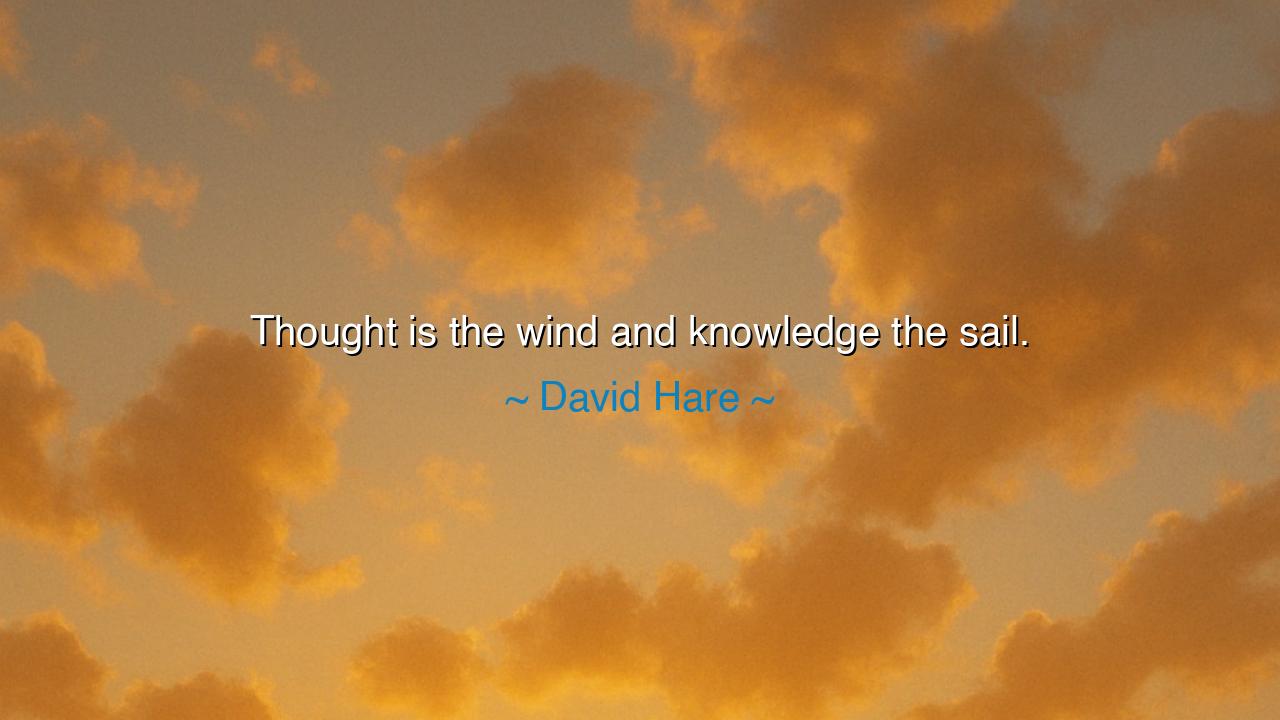
Thought is the wind and knowledge the sail.






“Thought is the wind, and knowledge the sail.” — David Hare
In these words lies a truth both simple and eternal. Thought is the wind, invisible yet powerful, stirring the still waters of the mind. It moves unseen, yet its touch bends forests, shapes oceans, and gives motion to all things that stand waiting in silence. Knowledge, then, is the sail—crafted with care, woven from experience, study, and the wisdom of those who have gone before. Alone, wind would scatter us into chaos; alone, the sail would lie lifeless upon the deck. But together, they form the vessel of human progress—the marriage of inspiration and understanding.
The ancients would have seen in this union the essence of the soul’s journey. For what is man without thought? A ship anchored forever in the harbor of ignorance. Yet what is thought without knowledge? A tempest unbridled, carrying one aimlessly toward ruin. The harmony of these two—the restless wind of imagination and the steady sail of wisdom—is what propels the seeker toward truth. The philosopher contemplates, the craftsman applies, and between them the world is remade.
Consider the story of Leonardo da Vinci, who lived in the golden dawn of the Renaissance. His mind was a hurricane of thought—curious, unbounded, forever wandering the skies and seas of the unknown. Yet Leonardo’s greatness did not lie in his dreams alone, but in his mastery of knowledge: the careful study of anatomy, the geometry of flight, the science of water and light. His thought filled the air with movement, but his knowledge caught that movement, shaping it into invention, art, and eternal wonder. The wind and sail worked as one—and thus, humanity was carried forward.
But let us also remember those who possessed the wind without the sail—those whose thoughts raced ahead of understanding, whose imaginations burned too fiercely for the vessel they steered. There is tragedy in the genius who dreams of flight yet never learns the principles that make flight possible. There is sorrow in the thinker who feels deeply but refuses to learn, to listen, to study the world that thought seeks to change. The wind alone may inspire, but without the sail, it leaves one adrift.
And likewise, those who cling only to knowledge, forgetting to think—to wonder, to question—find themselves moving nowhere, no matter how grand their ship. The libraries of the earth are filled with lifeless sails, waiting for a breath of wind. The true scholar is not he who gathers facts like stones, but he who turns them into a bridge of understanding. For knowledge without thought is stagnation, and thought without knowledge is folly.
Therefore, dear seeker of truth, learn to balance the tempest and the fabric. When your mind is filled with wind—when ideas surge like waves—seek the sail of learning to give them purpose. And when your knowledge grows heavy, rigid, and unmoving, let thought breathe through it like the morning breeze. Let neither one rule over the other, but let both serve your journey toward the horizon of wisdom.
In your daily life, practice this harmony. Read, not merely to know, but to think. Dream, not merely to imagine, but to understand. Observe the world and question it; study the world and love it. For when thought fills your sails and knowledge steadies your course, you will move with the great currents of creation itself—strong, sure, and eternal.
And remember: every voyage begins in silence, waiting for the wind.






AAdministratorAdministrator
Welcome, honored guests. Please leave a comment, we will respond soon